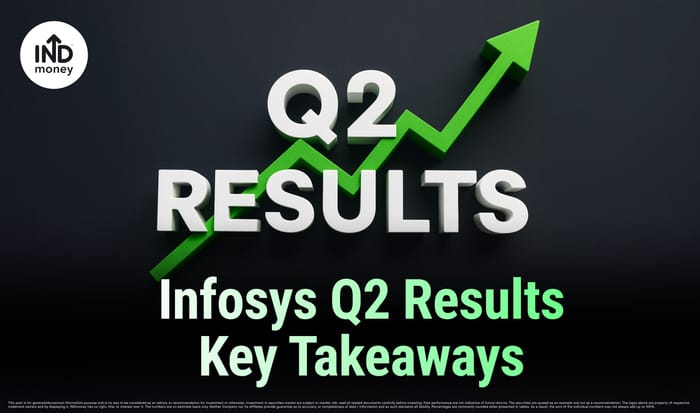
- Infosys Q2 Results at a Glance
- Here Are the Key Reasons Behind the Share Price Decline
- Bottom Line
- Disclaimer
Infosys Ltd., India’s second-largest IT services company, reported a healthy set of numbers for Q2 FY26, with a 13% year-on-year jump in net profit and revenue growth of 8.6%. Yet, its share price has been under pressure. Here’s what’s driving this disconnect between performance and stock price.
Infosys Q2 Results at a Glance
| Metric | Q2 FY26 | Q2 FY25 | YoY Change |
| Revenue | ₹44,490 crore | ₹40,986 crore | +8.6% |
| Operating Profit | ₹9,353 crore | ₹8,649 crore | +8.1% |
| Operating Margin | 21.0% | 21.1% | ↓ 10 bps |
| Net Profit | ₹7,364 crore | ₹6,506 crore | +13.2% |
| EPS | ₹17.76 | ₹15.71 | +13.2% |
Other highlights from the quarter include:
- Large deal wins worth $3.1 billion, with 67% being net new business.
- Interim dividend of ₹23 per share.
- FY26 revenue growth guidance raised to 2–3% (from 1–3%).
- Operating margin guidance maintained at 20–22%.
- Announced its largest-ever buyback of ₹18,000 crore at ₹1,800 per share.
- Continued investment in AI, cloud and digital services, along with plans to hire freshers despite industry-wide slowdowns.
On paper, these results indicate steady growth and strong fundamentals. Yet, the Infosys share price has been on a declining trend after the announcement.
Here Are the Key Reasons Behind the Share Price Decline
1. Muted Revenue Growth Guidance Disappointed Investors
While the company raised the lower end of its guidance, the overall 2–3% constant currency growth outlook remains modest. Investors were hoping for a more confident upgrade, especially given the robust deal pipeline. The cautious tone suggests that management is not expecting a sharp near-term rebound, which tempered market enthusiasm.
2. Global IT Spending Slowdown Weighs on Growth Visibility
Infosys derives nearly 85% of its revenue from North America and Europe, both of which are experiencing macroeconomic uncertainty. High interest rates, delayed transformation projects, and tighter client budgets have led to slower deal ramp-ups. Even though the company is winning deals, the actual revenue conversion is likely to remain gradual, making investors skeptical about near-term growth acceleration.
3. Margins Are Stable, But Lack Upside Triggers
Operating margin stood at 21%, almost unchanged year-on-year. Infosys has done well to maintain margins through cost controls, but there were no positive surprises. Some peers have hinted at margin tailwinds from pricing and automation, whereas Infosys’ outlook remains conservative. This relative positioning matters to institutional investors.
4. High Expectations Post Buyback and Big NHS Deal
The ₹18,000 crore buyback and the £1.2 billion NHS contract had already pushed up the stock price in the weeks leading to the results. When Q2 numbers didn’t deliver additional upside, profit-booking kicked in. The stock movement reflects a “buy the rumour, sell the news” pattern often seen in large-cap counters.
5. Valuation Leaves Less Room for Error
Infosys trades at a forward P/E of around 21-22x, which is fair but not cheap given muted growth. Compared to peers like TCS (which commands a premium for its stability) and HCL Tech (which has surprised positively in some verticals), Infosys doesn’t offer a valuation edge, making it more sensitive to negative sentiment.
Bottom Line
Infosys has delivered stable performance, backed by strong deal wins, solid margins, and shareholder-friendly policies. However, short-term share price trends are being influenced more by guidance, global headwinds, and investor expectations than by the quarter’s absolute numbers. For long-term investors, this could be a healthy consolidation phase. But in the near term, without clear catalysts, the stock may continue to face pressure.
Disclaimer
Investments in the securities market are subject to market risks. Read all the related documents carefully before investing. The securities are quoted as an example and not as a recommendation. This is nowhere to be considered as advice, recommendation, or solicitation of an offer to buy or sell or subscribe for securities. INDStocks SIP / Mini Save is a SIP feature that enables Customer(s) to save a fixed amount on a daily basis to invest in Indian stocks. INDstocks Private Limited (formerly known as INDmoney Private Limited) 616, Level 6, Suncity Success Tower, Sector 65, Gurugram, 122005, SEBI Stock Broking Registration No: INZ000305337, Trading and Clearing Member of NSE (90267, M70042) and BSE, BSE StarMF (6779), SEBI Depository Participant Reg. No. IN-DP-690-2022, Depository Participant ID: CDSL 12095500, Research Analyst Registration No. INH000018948 BSE RA Enlistment No. 6428. Refer to https://indstocks.com/pricing?type=indian-stocks; https://www.indstocks.com/page/indian-stocks-sip-terms-and-condition for further details.